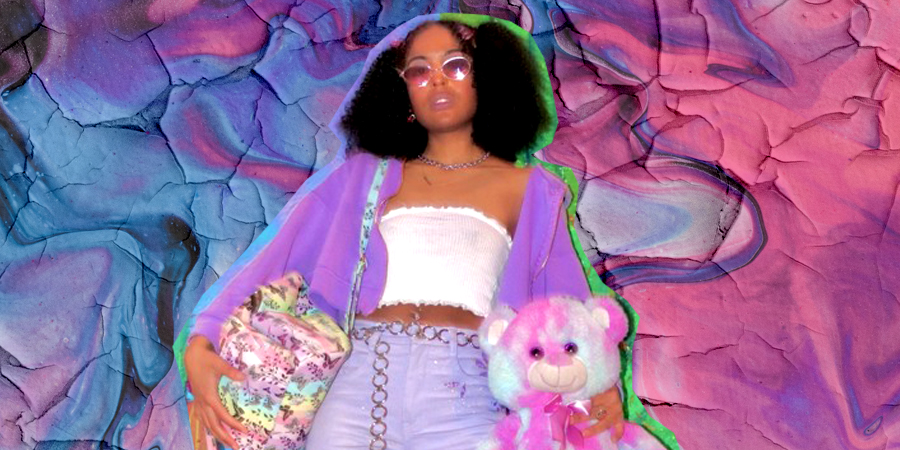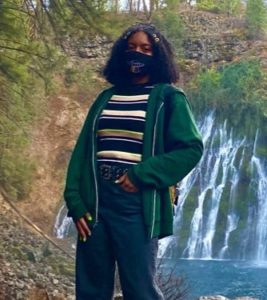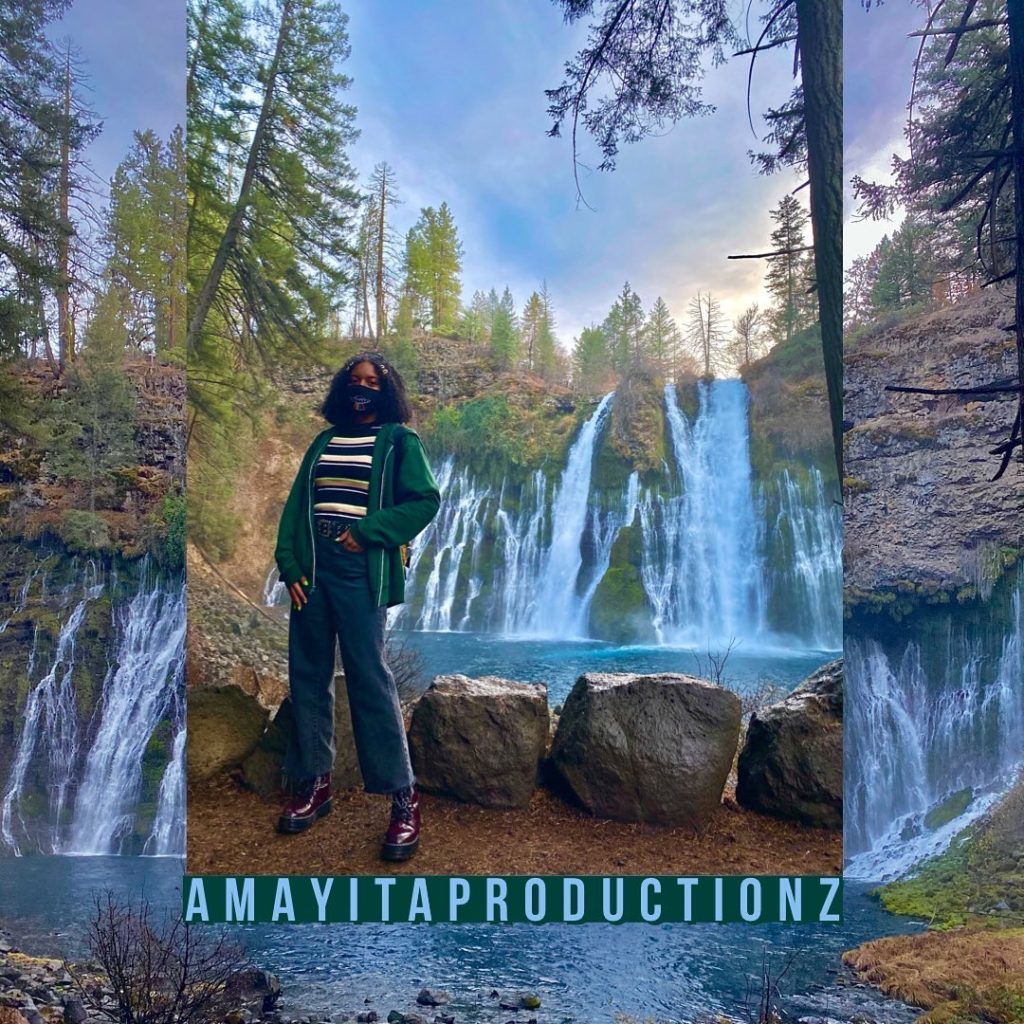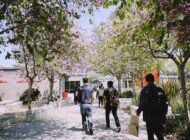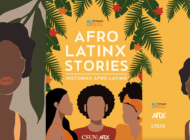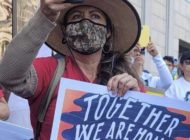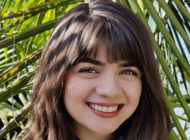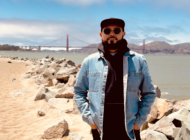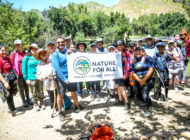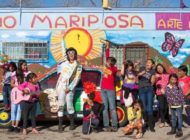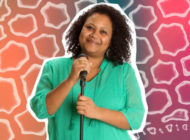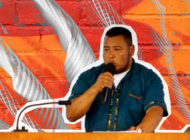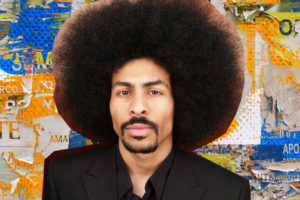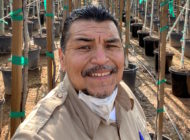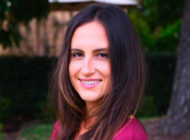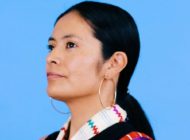In this episode, Yasmine Cárdenas talks to Amaya Taylor, a CSUN student majoring in child and adolescent development who grew up in Los Angeles’s South Bay.
By YASMINE CÁRDENAS
EL NUEVO SOL
Yasmine Cárdenas: Welcome to Radio Nepantla, a podcast by El Nuevo Sol, the multimedia site for the Spanish-language journalism program at California State University at Northridge. My name is Yasmine Cárdenas.
The title of this series is Afro-Latinx. We want to tell here diverse stories of Afro-Latinx, Black-Latinx and Afro-Latin American identity.
According to the Pew Hispanic Center, one out of every four Latinos in the nation identify as Afro-Latinx. This is the same proportion of Afro-Latin Americans in that region.
We decided to use the term Afro-Latinx—with X—to be inclusive of non-binary people. The umbrella term “Black-Latinx” refers to biracial people with one African-American and one Latinx parent. The umbrella term “Afro-Latin American” refers to people of African ancestry in Latin America.
Yasmine Cárdenas: In this episode, I interviewed Amaya Taylor. Amaya Elizabeth Taylor is a CSUN student majoring in child and adolescent development. As a California native, Amaya grew up in a community in Los Angeles’s South Bay. The city is diverse with Latinos, Whites, Asians, Black Americans and Pacific Islanders.
Amaya Taylor: I grew up in Lawndale, California. And I feel like growing up in Lawndale, I was around many Latinos and, growing up, I spent a lot of time with my Latino side of the family. I identify as a Latina woman and for my race, I identify as a Black woman. There was also Asian-Americans. It wasn’t until high school where I was around African-Americans. It did get more diverse as I entered high school. So, I was around Pacific Islanders as well—a community with a lot of minorities.
Yasmine Cárdenas: Amaya’s experience growing up in Lawndale was starkly different because her mother is Latina and her father is African-American from California. Growing up, Amaya did feel like her experiences were different due to her parents’ races.
Amaya Taylor: My mom is from Nicaragua. I believe she was born in Bluefields and then my dad is from Los Angeles, California. And he went to school in Gardena. And then my mom came to California when she was about five years old and she grew up in Southeast L.A. I definitely did feel like my parents had a different relationship than my peers because of their race. But I just feel like my experiences were different. Because sometimes I couldn’t relate to what my peers would go through in their households. I’ll be like, “oh, mine’s a little different, you know, I can’t relate to that.”
Yasmine Cárdenas: As a child Amaya had found friends that she was able to connect with due to their shared cultural background. She explains that her friend groups have remained the same in regards to the ethnicity of her peers.
Amaya Taylor: I feel like I gravitated more strongly with the Latinos. And now I would say my peer group has been consistent, I stick and have more Latino friends. And I do feel like it’s based off of experiences as well, because I grew up around my Latina side of the family. I’m able to relate to them a little more as far as like, you know, language and culture, foods, family traditions.
Yasmine Cárdenas: Despite finding friends she felt like she could relate to, Amaya did feel “rejection” from both sides of her peer groups. Amaya also experienced several microaggressions—a term used to describe brief and commonplace daily interactions, where people intentionally or unintentionally communicate negative attitudes toward marginalized groups.
Amaya Taylor: I definitely did feel rejected by both sides. By my Black peers—I feel like they weren’t accepting of me because they would feel like, “oh, you’re Whitewashed,” or, “oh, you know, you talk like a Mexican.” And it was just very like, “oh, I’m not trying to, you know, this is who I am and what I’m used to.” And then from my Latino peers I feel like they also rejected me at times because they were like, “oh, you know, you’re very dark—you’re too dark.” “My parents don’t like Black people. They say bad things about Black people.” And I just would kind of not know how to react. In the back of my mind, I was like, “well, I’m Black, too, so you’re kind of referring to me as well.” And sometimes they’ll tell me things like, “oh, you’re the exception.” And it’s like, “oh, I’m pretty sure there’s other, you know, Black folks out there who are similar to me. I’m not the only exception.” But I feel like because of my racial identity, coming from two ethnic backgrounds, it did cause confusion among both groups and even within myself. So I did feel rejection growing up from both sides and also from other races too, growing up. Now, I feel like it’s just accepting my own self and the people who accept me are going to gravitate towards me. And that’s what really matters. People would assume my personality based off of how I look and I would just prove them wrong, you know, because I feel like it’s not always fair to judge someone based off how they look because you don’t know their background.
Yasmine Cárdenas: The rejection that Amaya felt from both sides left her, feeling confused within herself. She compared her appearance to her Latina friends, but eventually came to a very important realization.
Amaya Taylor: I would feel that I wasn’t as pretty as them because I wasn’t, I wasn’t as light as them, you know? I would feel like the outcast because most of my friend groups were Latinas so I would feel like, “oh, they are prettier than me. I’m the ugliest one here, because I’m the darkest one here.” But I feel like after a while, it’s like, you just come to realize that race isn’t, isn’t something that defines you as a person.
Yasmine Cárdenas: Music played a vital role in Amaya’s life. In her house, she was exposed to different genres of music through her mother, father and her mother’s side of the family.
Amaya Taylor: Growing up music was huge. I listened to different genres from different places. So my dad was very into hip-hop and old school rap. So I was very into Snoop Dogg, Tupac, Too Short, Eazy-E—you know, a lot of these old school rappers—Ice Cube. And my mom, she would listen to rock en español. I listened to bands like Maná, um, Los Enanitos Verdes, Hombres G, and they would also listen sometimes to the radio. But they would put on like 98.7 and that was like alternative music. It’d be like, Green Day, Linkin Park, you know, a lot of alternative music. I still listen to all of those genres today. Then when I would spend time with, my cousins and my tías from my mom’s side of the family, they listened to like reggaeton music, like Ivy Queen, Daddy Yankee, a lot of Bachata—Romeo Santos. So growing up, it was very diverse. And then I also had my own style of music that was different from all of those.
Yasmine Cárdenas: I feel like everybody’s parents went through that alternative phase like my parents, they bought me a boombox one year for Christmas and I got like a Green Day CD and then my parents used to blast No Doubt.
Yasmine Cárdenas: Though she did grow up closer to her Latino side, she did see her father’s side of the family, albeit not as often.
Amaya Taylor: My brother doesn’t speak Spanish; I’m the one who speaks Spanish. And I feel like a lot of it is due to me being raised with my cousins and my Nana because my Nana didn’t speak English very well. She would speak to my cousins and all of us in Spanish. So I was hearing Spanish more. My dad’s side of the family, the family we do have contact with it was very small. So my dad’s two sisters. And then my dad’s dad, which is my grandpa. And then my dad’s mom, I was very close to her, my grandma, but she passed away when I was younger. So it was just my two aunts and they’re about seven to 12 years older than me. So I would keep in contact with them, but, growing up with my mom’s side of the family, I have family that are closer to my age and it’s more of us. So it was kind of like, I would spend time with them, but my dad’s side of the family, I wouldn’t see them very much just because he has little contact with them.
Yasmine Cárdenas: She explains that she noticed how different her hair was from those around her and how that played a role in her identity.
Amaya Taylor: Growing up, because my mom is Latina, she doesn’t have my texture of hair, so she was kind of lost, trying to do my hair, and sometimes she’d get frustrated cause she wouldn’t know how to do it. Sometimes she just put hair stuff and put my hair in a bun. And I just always felt so insecure because I wanted my hair to be down and long. Like, my peers and it was just always up. And I was like, I don’t want it up. You know? So sometimes I would take it down and I’d come back home. And she’s like, “what happened to your hair?” But, yeah, it’s definitely a learning experience. I’ve gone through so many different hair products to this day, trying to figure out what works best for my hair. I even remember one time when I was in fourth grade, I wore my hair down for one of my first times ever. And I had this little bow in it and I kept touching it cause I was just very self conscious about my hair. So I kept touching it, touching it, and my teacher, she said, “Ms. Amaya, I need you to stop touching your hair.” I was just like, “okay.” But yeah, my hair has always been something that I’ve been conscious about just because it was different from people growing up. I feel like my hair was just always poofy and everyone’s hair was just long and straight and down to there, you know, butt.
Yeah. I’ve had people in my life tell me like, “oh, you know, you should straighten your hair.” But it’s never rubbed me the wrong way. But I do feel like they’ve been curious to see different styles on my hair because my hair is just very curly and I just leave it as is. I feel like they’d been curious to see like, “oh, how would you look with a different hairstyle?” Because I don’t straighten my hair often and I know other African-American girls, they have different styles of hair, like they have braids and they have different hair colors. And that is something that I want to try and that I want to experiment with.
Yasmine Cárdenas: Negative experiences that she encountered only added to the internal struggle she had with her hair.
Amaya Taylor: I’ve had people ask me if they could touch my hair and it’s never rubbed me the wrong way. I’m just like, “oh, they’re curious.” But there has been one experience that was kind of a bad experience. I was in ninth grade and I remember I was walking and I had my headphones in, walking to my next class. And a girl came up from behind me and she yanked on my hair. She pulled it and I took out my headphones and I looked at her and she looked at me and she’s like, “oh, I just wanted to see if it was real.” And I literally, I just kept walking. I don’t even know if I said anything. I was just kind of shocked that she even did that. I don’t know why some people, you know, do things like that, like overstepping boundaries. I just felt like it wasn’t her position to touch my hair. She wasn’t someone who I was close to or someone who I knew personally.
Yasmine Cárdenas: In high school, Amaya had the opportunity to reconnect with a part of herself through being surrounded by a diverse group of peers and playing sports.
Amaya Taylor: I did kind of shy away from my African American side. I kind of in a way, there was a point in time where I wanted to dismiss it. And I was just very upset with myself for how I looked. And I was very insecure for being an African-American woman and it was something that I had to build in me, being okay with how I look and my complexion, my hair texture. I kind of blocked the identity away from myself and it wasn’t something that I started engaging with until high school, when I was surrounded by more Black peers. That’s when I feel like I really started to embrace, “I am Black too.” I was in volleyball when I was in high school and there were a few Black girls in volleyball as well. I started hanging out with them and it just kind of really made me get more in touch with that side of my identity, because I feel like I didn’t really have a lot of Black friends growing up. So those were some Black friends that I had that were genuine connections and it felt nice. I just started engaging with more Black peers because they were in my classes. So I was able to get to know them more. And because I was around the more I was nice. And as you said, it felt like I was reconnecting.
Yasmine Cárdenas: Amaya proudly embraces both of her different cultures, but she recognizes that there is no such thing as being “enough.”
Amaya Taylor: I’m from here and there, because I feel like I can be from two different places and it’ll shape my identity and who I am, because I’m from both of those places. I feel like both of those places play a role in who I am. I feel like people are always going to expect more, you know, I feel like it’s never enough. No matter what I do at the end of the day, it’s not going to be enough to satisfy both cultures. It’s always going to kind of be like, “Oh, well, she could be more like this or more like that.”
Yasmine Cárdenas: Most of us have suffered an identity crisis at some point in our lives. An identity crisis is defined as “a period of uncertainty and confusion in which a person’s sense of identity becomes insecure.” Amaya has experienced several identity crises, with one of them occurring very early on in her life.
Amaya Taylor:I feel like one of my first identity crises was in middle school. I was just kind of unsure of which identity to live off of, as far as how I looked and my religion and what I believe in. And I feel like it was just a time where I really had to let go of the idea of who I thought I was to find a new person, you know, not a new person, but create a new more authentic version of myself. And also when I was in college, I feel like I had another identity crisis because so many changes were happening and I just had to let go of, you know, what I thought I needed and who I thought I was to be reborn pretty much.
Yasmine Cárdenas: She explains how her view of religion has changed, especially after experiencing an identity crisis at an early point in her life.
Amaya Taylor: Growing up, I identified as Christian because mom and dad kind of identified as Christian not fully devoted, but we would go to church sometimes. I would go to church with my mom a few times. We weren’t big on religion, but they would tell me to practice, to pray and thank God. So in middle school I felt very lost in my mind. I was going through an identity crisis. I started to question God and I started to question my own religion and my faith because I felt as if I was going through really tough times. I started to think to myself, if I’m going through tough times, how can a quote, unquote, ‘God’ be so great. So I started, diving deep into like, what it meant to be religious and spiritual. For a while, I stepped away from religion. And to this day, I’m not a religious person, but I did get back in touch with what I feel is in my highest good.
Yasmine Cárdenas: Amaya mentioned that she experienced another identity crisis. Her experiences at CSUN would help navigate this time in her life.
Amaya Taylor: I didn’t really go in with a strong identity of who I was. I feel like. I thought I knew who I was, but I didn’t, because once I got to college, the idea of who I thought I was just started falling apart. And that’s when I had my identity crisis and from the classes and experiences that I had at CSUN at the time of my identity crisis, I feel like that gave me a stronger foundation to bounce back from the identity crisis that I was having. I came out of the identity crisis with a stronger foundation of who I was and a reinvention of myself pretty much.
Yasmine Cárdenas: Although Amaya is studying child and adolescent development at CSUN, she has decided to pursue a career making music. It was a decision that she came to after seeing one of her favorite DJs perform at her third music festival.
Amaya Taylor: He gave a speech saying follow your dreams. And it doesn’t matter who you are, what you do. If you want something, you can get it. And as he was giving that speech, I wasn’t aware that I wanted to make music, but his words were just very encouraging and uplifting. So since that day I’ve just been getting the ball rolling of actually making music.
Yasmine Cárdenas: Amaya, whose stage name is Amayita, does not have a definitive genre to the music she creates. Music has always played a key role in her life. She explains what artists she admires and how they have inspired her.
Amaya Taylor: I do make electronic trap. I have a few artists who do inspire me and they inspire me from their music and also the way that they present their art. So Hippie Sabotage, those are two brothers and they produce music and I really am inspired by them because they’ve come a long way and their music is very intimate. It comes from a very sincere place. You can hear it in their lyrics, their words, also Lil Peep. I loveLil Peep, because I feel like he did something very different that not many artists have done and he mixed two different genres of music and mashed them together, which was alternative rock with trap hip hop music. So he infused those two beats, two genres of music and created his own style of music. And I feel like that’s genius. And also I really, really, really love 2Pac, I feel like he’s very inspirational just with his words and the way he carried himself. He is a very determined rapper and his raps were about his experiences. He was speaking from what he knew and what he saw around him. And I feel like that’s very powerful, that’s what art is about or is about how you feel and what you see.
Yasmine Cárdenas: Amaya explains that she has much bigger plans for music career. She wants to find a way to help those around her and give back.
Amaya Taylor: So as a long-term goal, what I really truly want to accomplish is I want to obviously perform my art around the world and DJ around the world. But I do want to use some of the money that I get to travel to different schools in low income areas and fund their schools, fund the classrooms and the school districts. Just to see how is it that these students are learning? What is it that they need in the classrooms? How can we make their learning more efficient? Especially in other countries, not just America. But other countries as well, I just want to check out their schools and work with the students as well and ask the students directly, not just faculty and the adults, but ask the students, what do you want to see in your school? And just help them. But I feel like I could do that on a large scale with the money I bring in from my music.
Yasmine Cárdenas: Music has become an outlet for Amaya to express herself. She hopes that she can be an inspiration to those who listen to her music because at the end of the day, that’s what pushes her to keep doing what she loves.
Amaya Taylor: I do feel like I’m being my most authentic self through my music and that’s what empowers me to continue to put out music and continue to work on my art. I feel like a lot of what I feel and what I write about are experiences that many people can relate to and can share. And I know sometimes people feel as if they’re alone in their journey and in a way we kind of are. But I do feel like we have people there that do go through similar situations, but they’re not always going to speak up on it. So I feel like in my music, I really dive deep into those experiences and those thoughts and those feelings. And that’s what gets me excited to share with the world, because I know if a million people listened to it, And, you know, they don’t really like it there at least will be one. Who’s like, you know what I do like that. So I’m writing for that one person, you know? That’s like gets me going and keeps me going.
Yasmine Cárdenas: For those who are struggling with their own identity, Amaya offers kind words of encouragement.
Amaya Taylor: I would say that it’s okay to struggle. Most of us, if anything, all of us struggle. And I feel like learning about yourself is a lifelong journey. It’s not something that is done overnight or something that has a destination, but it’s something that you practice every day and you learn more about yourself every day just by living and. Take it easy because I feel like oftentimes we’re very hard on ourselves and the pressure from society causes us to be even more harder on ourselves. So I feel like just take your time with living life and wherever you’re meant to be, you will get there.
Yasmine Cárdenas: Thanks for listening to Radio Nepantla—La Voz que Traspasa Fronteras. We invite you to listen to the rest of the series Afrolatinx … We will tell you stories of Afro-Latinx identity. Listen to our podcast on your favorite platform. You can also check our SoundCloud channel—ElNuevoSol—or our website: ElNuevoSol dot net. This was a production of El Nuevo Sol—the multimedia project of the Spanish-Language Journalism program at Cal State University, Northridge. This episode was produced and edited by: Yasmine Cárdenas. Voices: Yasmine Cárdenas and Amaya Taylor. Music by the Afro-Colombian group Kombilesa Mi. See you next time.
Tags: #AFLX Afro-Latinx Amaya Taylor CSUN Lawndale CA podcast Radio Nepantla Yasmine Cárdenas







